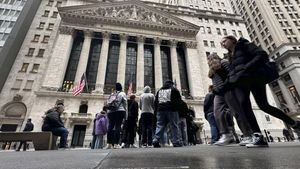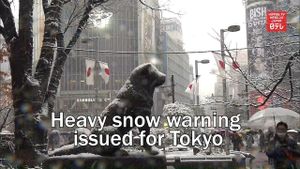With the 2025 federal election on the horizon, candidates across Germany are ramping up their campaigns, ignited by recent incidents and public tensions.
Sahra Wagenknecht, the Spitzenkandidatin of the BSW, kicked off her campaign with the "Sahra kommt!" tour at Munich's Marienplatz, where she criticized both the SPD and the Greens for their handling of migration issues. "They have been responsible for the fact the AfD is now twice as strong as three years ago," she stated, pointing to what she termed as their hypocrisy as they portray themselves as antifascists.
Wagenknecht emphasized the "loss of control" at the borders, arguing, "Instead of discussing solutions, we're debating who can vote with whom in the Bundestag. That’s just sick. This is simply out of touch with reality." Her remarks echo growing disenchantment with traditional parties on the migration issue and solidify her position as the voice of dissent against the current political establishment.
On political shifts within the Bundestag, Thorsten Frei of the CDU questioned existing EU asylum rules during the ARD show "hart, aber fair," stating, "Dublin 3 hasn't worked before, and it doesn’t work now." To address this, the Union is proposing new rules for third-country policies, signaling significant changes to Germany's approach to immigration.
Frei's comments came after the Union's five-point plan for tightening migration policy was passed only with the backing of the AfD, raising concerns over the Union’s increasing alignment with far-right politics. Following this, demonstrators took to the streets nationwide, with around 160,000 people marching against the CDU's cooperation with the AfD.
The protests were organized by various groups opposing right-wing extremism, determined to sustain pressure on the government as they lead up to the elections. Christoph Bautz from Campact stated, "The wave of protests will continue until the federal elections, hoping to make voters reconsider giving their votes to the AfD." This reflects widespread anxiety about the rising influence of the far-right party.
The Greens responded on their front with their own proposals to reform internal security, presenting a ten-point plan to execute outstanding arrest warrants and calling for increased staffing and power for the Federal Police.
Party leaders like Robert Habeck have vocalized their opposition to moving toward policies championed by right-wing parties. Habeck stressed the necessity of addressing the long-term challenges presented by right-wing populism, stating, "We must increase security for everyone, irrespective of their migration history." His remarks highlight the balancing act required to uphold democratic values without conceding ground to extremist rhetoric.
Meanwhile, the CDU's Friedrich Merz faced backlash over the party's distancing from the mainstream as they sought support from the far-right. Surveys indicate the CDU remains stable in popularity at 30%, with the AfD trailing at 22%. Interestingly, this appears to have had no detrimental effect on the CDU’s standing, showcasing the complexity of voter sentiment as the parties navigate these turbulent times.
Protests against the recent parliamentary decisions culminated significantly, with more than 250,000 protesters taking to the streets of Berlin alone. Such mass mobilizations suggest not only discontent over migration policy but also reveal the electorate's sensitivities around national identity and inclusion.
The atmosphere of the campaigns is undoubtedly being charged by various incidents. Vandalism against election posters for parties like the CDU and the AfD has been reported, with over 60 incidents of destruction primarily affecting their materials. This highlights the rising tensions as opposing parties engage openly with their platforms.
Following vandalism targeting the CDU offices, party member Steffen Bilger condemned these actions, calling them "unacceptable" and urging for the end of hostility toward the party. The incident brings to light the increasingly polarized political climate as groups advocate fiercely for their beliefs.
Further complicity within the political atmosphere stems from accusations leveled by the Greens against the Union’s collaboration with the AfD, decrying it as irresponsible. Robert Habeck remarked, "The Union has failed to accept responsibility for its actions." He stressed the importance of unity among moderate parties to prevent the normalization of extremist views.
Both the political discourse and public demonstrations reflect a rapidly shifting sentiment as the election closes in. Many believe the upcoming vote is not just about policy but about safeguarding democratic norms and opposing the rise of extremist viewpoints. Amid these changes, the strategies being employed by the parties seem more important than ever as they vie for the electorate's favor.
With these developments occurring within such proximity of the election date, candidates will need to carefully navigate their narrative to align with the electorate’s concerns without falling prey to extremist rhetoric. The ramifications of these strategies could define the political scene well beyond the 2025 election.



